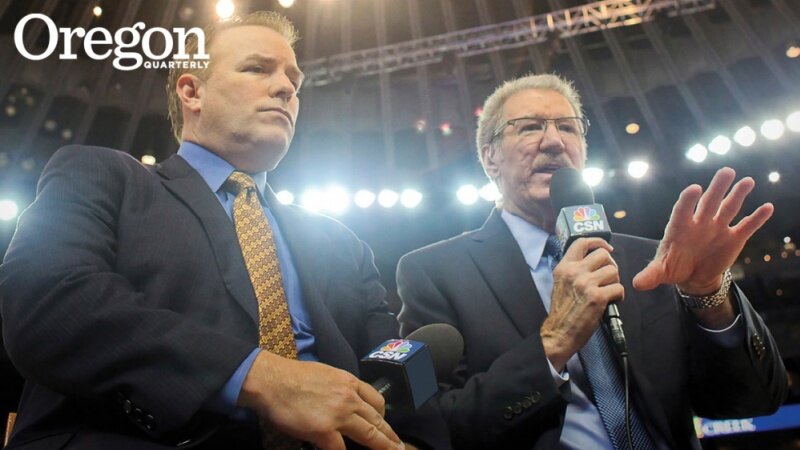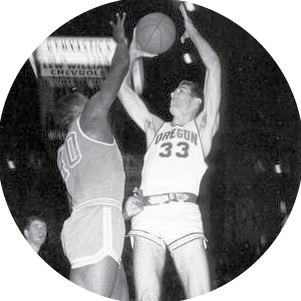

Jim Barnett is a basketball lifer. After sprouting up four inches before his junior year in high school, he became a dominant player and began a basketball journey that continues to this day.
In three years at the University of Oregon in the mid-1960s, he played his way into the UO Hall of Fame, leaving as the program’s leading scorer. He went on to play 11 years in the NBA alongside some of the greats of the game. For the last 34 years, he’s worked as a broadcaster for the Golden State Warriors, becoming a fan favorite, transitioning to a part-time, radio-only role last fall.
At 76, Barnett, BS ’66 (physical education), is still going strong. After the NBA shut down its season in March because of the COVID-19 (coronavirus) pandemic, he hunkered down at his girlfriend’s place in Charlotte, North Carolina.
He was disappointed the season came to an abrupt halt, but realized the game matters little when a pandemic is sweeping the globe.
“I would have preferred the season to end in a normal way,” he says, “but basketball and all sports are in limbo now because of this pandemic.”
After a standout career at Ramona High School in Riverside, California, Barnett was recruited heavily by West Coast colleges.
Oregon coach Steve Belko was the first coach to contact him, and the first to offer him a scholarship. He liked the campus and the size of the school, and decided he’d have a chance to play as a sophomore (freshmen were ineligible to play in the NCAA until 1972).
The Ducks weren’t very good when Barnett was there, logging only one winning season from 1963 to 1966. The 6-foot-4-inch guard was the best player on the squad and among the elite in the conference and the country, earning All-American honors.
Barnett says he was among the quickest players on the team, the top one-on-one player, and a strong defender, often taking on the opponent’s best scorer. He led the Ducks in scoring as a junior and senior, and was the top rebounder in his sophomore and junior seasons.
“I was kind of cocky,” he says. “I was pretty good and I knew it. Oregon State fans thought I was a hot dog.”
During his last game against Oregon State, Beaver fans chanted his nickname and pelted him with hot dogs during warm-ups.
“I thought it was very funny,” he says. “I loved it.”
He averaged 17.7 points at Oregon, and departed as the program’s leading scorer with 1,325 points in an era with no shot clock and no three-point shot. (He’s now 19th on the list.) The Boston Celtics, then in the midst of a dominant run in the NBA, drafted him in the first round of the 1966 draft, eighth overall.


Barnett played 11 years for seven NBA teams, alongside some of the greatest to ever play the game: Bill Russell, John Havlicek, Rick Barry, Nate Thurmond, Walt Frazier, Earl Monroe, Pete Maravich, Elvin Hayes, and Julius Erving.
“I played with 10 Hall-of-Famers,” he says.
Barnett often defended opponents’ best guards, which meant the likes of Jerry West, Oscar Robertson, Walt Frazier, Nate Archibald, and Calvin Murphy.
“I loved the challenge of guarding the top players,” he says. “I always thought I could stop them. Nobody ever intimidated me.”
Barnett’s best year statistically came in 1970–71, with the Portland Trail Blazers in the franchise’s inaugural season, when he averaged 18.5 points, 4.8 rebounds, and 4.1 assists per game. In one game against the rival Seattle SuperSonics, he poured in 42 points.
That same season, Barnett sank a long-range desperation shot against the Lakers that inspired the Blazers’ broadcaster, Bill Schonely, to yell, “Rip City!,” an exclamation that became synonymous with the team and the city.
“I always loved to play,” he says. “I had joy in playing the game.”
Barnett played three seasons with the Warriors in the early 1970s, but ended up having a much longer career with the franchise as a broadcaster.
Barnett started broadcasting for the Warriors while still a player. After retiring from the NBA in 1977, he moved back to the Bay Area and continued calling games when opportunity arose.
Eventually, the Warriors hired him to be their full-time color commentator. He called games on television for 34 years.
Golden State fans came to appreciate Barnett’s analysis, based on knowledge gained from decades in the game. He even had his own catch phrase, “Quite frankly,” that would often lead into an insightful comment.
When news leaked that the 2013–14 season would be his last calling Warriors games and he would transition to an “ambassador” role, Golden State fans rallied to Barnett’s side, using the hashtag #KeepJim and selling T-shirts with his visage. Ultimately, the Warriors kept Barnett on the broadcast team.
Last fall, when the Warriors opened their new arena in San Francisco, Barnett moved from TV to radio, a transition he says he was happy to make.
Reflecting back on six decades of roundball, Barnett says he has no regrets, only fond memories of the game and a desire to keep doing what he loves as long as he can.
“I am so grateful,” he says. “I never would have dreamed of this when I was 15 years old and dreaming of making the varsity.”
Tim Christie is a staff writer for University Communications.






































